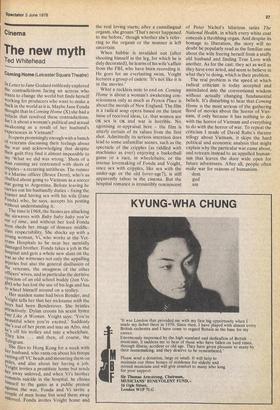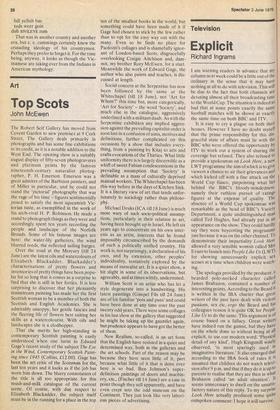Cinema
The new myth
Ted Whitehead
Coming Home (Leicester Square Theatre)
ln Letter to Jane Godard ruthlessly explored the contradictions facing an actress who wants to change the world but finds herself working for producers who want to make a buck in the world as it is. Maybe Jane Fonda thought that in Coming Home (X) she had a vehicle that resolved these contradictions. Isn't it about a woman's political and sexual awakening as a result of her husband's experiences in Vietnam?
It opens promisingly enough with a bunch of veterans discussing their feelings about the war and acknowledging that despite their guilt they find it almost impossible to say 'What we did was wrong.' Shots of a Man running are contrasted with shots of cripples — a recurring antithesis. The runner IS a Marine officer (Bruce Dern), who's as Chuffed about going to Vietnam as a soccer star going to Argentina. Before leaving he carries out his husbandly duties — fixing the toaster and having sex with his wife (Jane clnda) who, he says, accepts his posting without understanding it.
The time is 1968, the Stones are attacking the airwaves with Baby baby baby you're °Eit of time, and without her lord Fonda soon sheds her image of demure middleclass respectability. She shacks up with a Young woman, Vi, who works at the Veterans Hospitals to be near her mentally daMaged brother. Fonda takes a job in the hospital and gets a whole new slant on the War as she witnesses not only the appalling injuries but also the general disillusion of the veterans, the smugness of the other officers' wives, and in particular the derisive Cynicism of an old school buddy (Jon Voight) who has lost the use of his legs and has to wheel himself around on a trolley. Her maiden name had been Bender, and LN'oight tells her that her nickname with the noYs had been Benderover. She bristles attractively. Dylan croons his sexist hymn Just Like A Woman. Voight says: 'You're beautiful when you're excited.' Suddenly s,lle's out of her perm and into an Afro, and 1.1,Vs off his trolley and into a wheelchair. they kiss . . . and then, of course, the Telegram. , She flies to Hong Kong for a week with ner husband, who rants on about his troops cutting off VC heads and mounting them on and also about her having a job. oight invites a prostitute home but sends "er away unloved, and when Vi's brother eisnrnmits suicide in the hospital, he chains giinself to the gates as a public protest against the war. Fonda and Vi invite a couple of men home but send them away unloved. Fonda invites Voight home and
the real loving starts; after a cunnilingual orgasm, she groans 'That's never happened to me before,' though whether she's referring to the orgasm or the manner is left uncertain.
When hubbie is invalided out (after shooting himself in the leg, for which he is duly decorated), he learns of his wife's affair from the FBI, who have been recording it. He goes for an everlasting swim. Voight lectures a group of cadets: 'It's not like it is in the movies.'
What a reckless note to end on. Coming Home is about a woman's awakening consciousness only as much as Peyton Place is about the morals of New England. The film is a radical soap opera based on the latest issue of received ideas, i.e. that women are OK sex is OK and war is horrible. No agonising re-appraisal here — the film is utterly certain of its values from the first shot. Admittedly its serious intention does lead to some unfamiliar scenes, such as the spectacle of the cripples (as riddled with machismo as ever) enjoying a basketball game or a race, in wheelchairs; or the intense lovemaking of Fonda and Voight, since sex with cripples, like sex with the under-age or the old (over-age?), is still apparently taboo in the cinema. But the hospital romance is irresistibly reminiscent of Peter Nichol's hilarious satire The National Health, in which every white coat conceals a throbbing organ. And despite its homage to liberation, the story will no doubt be popularly read as the familiar one about the wife freeing herself from a stuffy .old husband and finding True Love with another. As for the cast: they act as well as they have ever acted, and seem to believe in what they're doing, which is their problem.
The real problem is the speed at which radical criticism is today accepted and assimilated into the conventional wisdom without actually changing fundamental beliefs. It's disturbing to hear that Coming Home is the most serious of the gathering flood of movies about the horror of Vietnam, if only because it has nothing to do with the horror of Vietnam and everything to do with the horror of war. To repeat the criticism I made of David Rabe's theatre trilogy about Vietnam, it skips the hard political and economic analysis that might explain why the particular war came about, and retreats instead to an appalled humanism that leaves the door wide open for future adventures. After all, people often make war for reasons of humanism.
dem gud am lidl yelluh bas tuds weer goin
duh SIVILEYE ZUM
That was in another country and another era, but e. e. cummings certainly knew the crusading ideology of his countrymen. Perhaps they prefer to forget it. For the time being, anyway, it looks as though the Vietnamese are taking over from the Indians in American mythology.



































 Previous page
Previous page